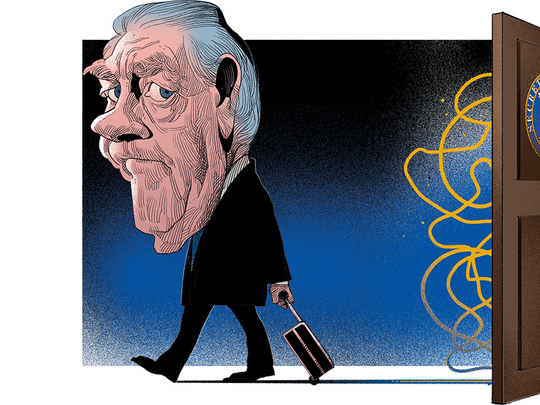
Rex Tillerson’s tenure as America’s secretary of state ended not with a bang, but with mass confusion.
This precise personnel move was reported in late November, so anyone who is surprised by this really shouldn’t be. By this point, in fact, anyone surprised by the reality-show nature of this White House’s personnel moves has been living in a secluded oasis.
Here are the top reasons why Tillerson was shown the door:
n 1) He did not have the worst policy instincts of the administration of United States President Donald Trump. Tillerson’s initial impulse to maximise his face-time with Trump was sensible, given the lack of a prior personal relationship with him. He acted as a brake on Trump’s worst instincts: The withdrawal from the Paris climate change accords, wanting to tear up the Iranian nuclear deal, a reluctance to give diplomacy a shot on the Korean Peninsula. Defence Secretary Jim Mattis is the most competent policy principal in Trump’s Cabinet, and he formed a close relationship with Tillerson.
n 2) This was an absolutely necessary move for Trump. The most important currency for diplomats is their credibility. If they say something will happen and then they are overruled by their boss, it’s a problem (this, by the way, is one reason that diplomats always seem so cautious and measured in their language). Trump had undercut Tillerson’s credibility on numerous occasions, and the constant leak campaign in the media that Tillerson was on his way out undercut his standing even further. To put this more simply: If you were a foreign head of government meeting with Tillerson, would you have taken his assurances seriously?
Mike Pompeo clearly has a much closer relationship with Trump and has displayed more public fealty to him. That relationship will give Pompeo more credibility as Secretary of State when he is speaking with foreign interlocutors.
n 3) Tillerson’s legacy will be as one of the most ineffective secretaries of state in modern history. His influence within the administration waned over time. His proposed redesign of the State Department was botched, and botched badly. His incompetent management helped trigger an exodus of seasoned Foreign Service officers and crushed morale among the remaining diplomats. There is no signature idea or doctrine or accomplishment that Tillerson can point to as part of his legacy. He was woefully unprepared for the job on Day One and barely moved down the learning curve. His incompetence undercut his ability to advance any worthwhile policy instinct.
Peter Baker and Gardiner Harris pull very few punches in their New York Times write-up of Tillerson’s time at State:
“But perhaps the most puzzling part of Mr. Tillerson’s tenure was his poor oversight of the State Department. As a former top business executive, his managerial skills were thought to be his chief asset.
“But he failed to quickly pick a trusted team of leaders, left many critical departments without direction and all but paralysed crucial decision making in the department.
“He approved one global conclave in Washington just eight days before the event was to start, ensuring that few leaders from around the world were able to attend. He rarely sat for comprehensive briefings with many of his top diplomats and often failed to consult the State Department’s experts on countries before visiting.
We live in a politically incorrect age, so let’s be blunt: Tillerson was an awful secretary of state.
n 4) Pompeo has the opportunity to become a good secretary of state. A competent secretary of state needs to cultivate ties with key stakeholders to succeed at the job: The White House, other Cabinet secretaries, Congress, the bureaucracy and the wider foreign policy community. As previously noted, Pompeo is tight with the president and has served in the Cabinet and Congress. The bureaucracy would ordinarily be wary of someone with his policy preferences. But Pompeo has the opportunity to build considerable goodwill just by, you know, properly staffing the agency and defending its budget a little bit better than Tillerson.
As for the foreign policy community, well, that’s a thing, because ...
n 5) US foreign policy is about to get even more hawkish.
Pompeo is far more hawkish than Tillerson on an array of policy issues, particularly Iran. Tillerson’s departure follows the exit of Gary Cohn, which means there are now two fewer voices in Trump’s Cabinet advocating for the benefits of the liberal international order.
On one level, it will be impossible for Pompeo to be a worse secretary of state than Tillerson, but he may still enable Trump’s most hawkish instincts.
— Washington Post
Daniel W. Drezner is a columnist and professor of International Politics at the Fletcher School of Law and Diplomacy at Tufts University.










